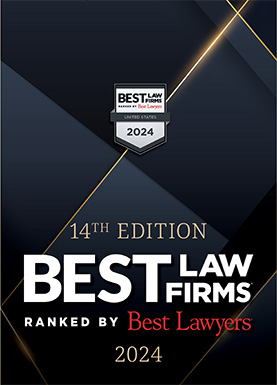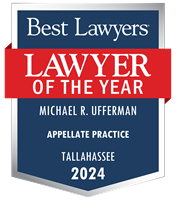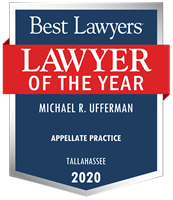
Florida Bar Certified Criminal Appellate Lawyer
Michael Ufferman is board certified in criminal appellate law and considered an expert in criminal appeals.
Criminal Appeals
If you or a loved one has been convicted of a crime, you should schedule a free consultation with an experienced Florida criminal appellate attorney to seek advice about your right to an appeal. Michael Ufferman’s practice focuses exclusively on criminal appeals and postconviction motions, and he has handled hundreds of Florida criminal appeals throughout his career.
Michael Ufferman practices before both state and federal criminal appellate courts, and he frequently travels throughout the state of Florida to advocate for the rights of his clients in all of the Florida District Courts of Appeal, the Florida Supreme Court, and the Eleventh Circuit Federal Court of Appeals. Mr. Ufferman handles all types of criminal appeals, including cases involving charges of murder, robbery, sexual battery, assault, drug trafficking, child pornography, RICO, white collar, and DUI manslaughter.
Michael Ufferman is the author of the annual treatise published by Thomson Reuters, Florida Criminal Practice and Procedure.
What are Criminal Appeals?
Michael Ufferman advocates for the rights of those who have been wronged by the criminal justice system. Following the imposition of a judgment and sentence, a defendant may appeal to an appellate court. Appeals are available to all criminal defendants in Florida to challenge a conviction at trial or (in some limited circumstances) a guilty plea. The purpose of the appellate process is to review lower court decisions to determine whether a “legal error” has occurred. Appellate courts function to ensure that the trial court did its job correctly and interpreted the law accurately. Although appeals are not easy to navigate, Michael Ufferman welcomes this challenge every single day. He began his appellate journey at the Florida Supreme Court as a Senior Staff Attorney and followed this bedrock experience to build what is now decades of a successful appellate practice. This background equipped Mr. Ufferman with the necessary tools, knowledge, and passion for honing in on the key issues in your case and advocating for the best possible outcome. Mr. Ufferman’s results speak for themselves. The first step is to schedule a free consultation, where Mr. Ufferman will discuss your case and walk you through the appellate process.
How to File a Criminal Appeal in Florida?
Following a guilty verdict, the trial court will enter a judgment and sentence. The Florida Rules of Appellate Procedure outline when and how parties can begin the appellate process. The deadlines are measured in days, not months or years. It is crucial to begin this step as soon as possible. The first formal step is to file a Notice of Appeal within 30 days. Filing the Notice of Appeal within the deadline initiates the process of pursuing the appeal.
What are the Steps of a Florida Criminal Appeal?
After an appeal has been initiated, the record has to be prepared by the clerk of the court, provided to Michael Ufferman, and ultimately transmitted to the reviewing court. The record includes all papers, documents, motions, evidence, and transcripts relating to the trial court proceedings. Indigent defendants can apply to waive the fees of preparation, but all other appellants must pay for the preparation of the record. There is only generally a 10-day window to begin this preparation after the notice of appeal has been filed.
A criminal case in Florida has two types of parties: defendants, and the State of Florida. Once an appeal has been filed, the party who is seeking the appeal (usually a defendant) becomes the Appellant, and the other party (usually the State of Florida) becomes the Appellee. The first step in the process is filing the Initial Brief by the Appellant to the District Court of Appeal based on where the trial court was located in the State. This is the opportunity for an attorney such as Mr. Ufferman to lay out the facts of the case, the summary of the argument, a well-researched and full argument of the issues, and the legal authority to be relied upon by the court. The Appellee then has an opportunity to argue against the issues presented in an Answer Brief. After the Answer Brief has been filed, the Appellant has an opportunity to rebut the arguments made in the Answer Brief in the last document filed before the court, a Reply Brief. Once all of the briefs have been submitted to the court, the case is considered “mature,” and it is assigned to a three-judge panel.
In addition to the written arguments, appellate cases may also have an oral argument, where lawyers for the Appellant and Appellee are given a short amount of time (usually ten to twenty minutes) to argue their respective positions in person. Michael Ufferman always requests oral arguments on his clients’ cases. Oral arguments are open to the public, and family members and friends are encouraged to watch (in person or online) – Michael Ufferman is a passionate advocate for his clients, and watching him argue your case will ensure your confidence in the attorney you have hired and the outcome of the case.
What are the Possible Outcomes When Appealing a Criminal Case?
After all arguments have concluded, the panel of judges will conduct their own research and discuss the case usually by “conference.” The judges will reach a decision and issue it in writing, including directions to the trial court on how to handle the case moving forward.
In the very best of circumstances, an appeal can result in a complete exoneration for the Appellant, but this is not the most common outcome. Otherwise, the best result to hope for is usually a new trial, which is much more beneficial than it sounds. If a reversal of the original trial is obtained, the State must decide whether it wants to go through the process of another trial or whether it even can. Witnesses may no longer be cooperative, have memory issues, or could have moved. The ability to retry the case with all of the available evidence free of prejudice can be an extremely powerful deterrent for the State or a path to a not guilty verdict if a new trial is pursued.
Unfortunately, not all appeals end in success. This does not mean it’s the end of the road though. First, a motion for rehearing or clarification can be filed with the reviewing court to clarify an overlooked argument or request that they specify the ruling. The rehearing process is not available to reargue a case; that is instead saved for higher courts. Issues with Florida law can be further appealed to the Florida Supreme Court, where the entire process starts over. Arguments based on Federal or Constitutional Law can be further appealed in the 11th Circuit Court of Appeals and then potentially even the Supreme Court of the United States.
Appeals typically take a year to be resolved. But the results of a successful appeal can be life-changing for the accused and are always worth the wait.
What are the grounds for appeal in criminal cases?
It is difficult to label every potential appealable issue. The very nature of appellate law means that new challenges to the law arise every day. There are many challenges that are raised repeatedly in criminal cases, and are the first place to begin looking:
- Jury problems
- A member was not fit to serve
- The selection process prejudiced the defendant
- Evidence issues
- Evidence was excluded that should have been seen by the jury
- Evidence was inappropriately entered, and this caused prejudice for the jury against the defendant
- Prosecutorial misconduct
- Misapplication of the law by the judge
- Jury instructions were not proper
- Judge did not rule correctly on crucial issues
- A motion to suppress evidence was improperly denied
- A motion to dismiss should have been granted
- Sentencing was not handled properly
- A Stand your Ground/Immunity proceeding was not properly held or ruled upon
- A motion for a mistrial was improperly denied
- A motion for a judgment of acquittal was improperly denied
- A motion in limine was improperly denied
- A competency proceeding was not properly held or ruled upon
If you or someone you love was convicted of a crime in Florida, schedule a free consultation as soon as possible to discuss your right to an appeal. The Michael Ufferman Law Firm is located in the Russel Corners Office Complex on the left-hand side of Raymond Diehl Road in Tallahassee, Florida, right off of Interstate 10.



